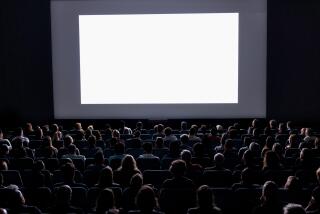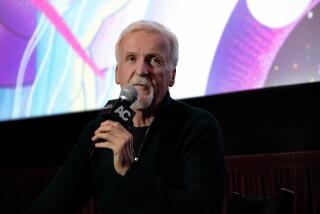‘2001’ Panel: A Cyberspace Odyssey
- Share via
It wasn’t as bad as Bill Gates’ computer crashing during a recent trade show demo of Windows 98, but it was close.
Science fiction guru Arthur C. Clarke was scheduled to join in a panel discussion about “2001: A Space Odyssey,” the landmark science fiction movie based on his writings. Clarke was to link up to the Beverly Hills event from his home in Sri Lanka via the Internet.
But for an embarrassing 45 minutes, the 500 guests gathered last week at the Writers Guild Theater could only observe Clarke complain to his technical assistant that he couldn’t see or hear his audience half a world away.
“Human error!” shouted one of the fans who had crowded into the theater for a special 30th anniversary screening of the classic.
Once the humans were able to master the computers, the event, co-sponsored by the American Film Institute and the Alfred P. Sloan Foundation, proceeded smoothly.
In addition to Clarke, the panel included Keir Dullea and Gary Lockwood, who played astronauts Dave Bowman and Frank Poole in “2001”; Bill Anders, Apollo 8 astronaut; Tom Hanks, actor and space fan; David Stork, artificial-intelligence researcher and author of “HAL’s Legacy: 2001’s Computer as Dream and Reality”; and Joan Horvath, a Jet Propulsion Laboratory engineer working on a proposed flight to Jupiter’s icy moons. Science writer Andrew Chaikin moderated the discussion.
While many of the elements from the 1968 film turned out to be predictors of the future, many others were off the mark. The surprising part, according to several panelists, is which guesses fall into which category.
For instance, the movie accurately depicts a world where space shuttles are routine, voiceprint IDs are used for security clearance and computers easily defeat humans at chess.
On the other hand, said Clarke, “who would have imagined that the Bell system and Pan American [two companies featured prominently in the film] would be gone by the turn of the century?”
The panelists also shared their favorite scenes from the movie. Astronaut Anders said he enjoyed the scenes of the moon but that the real thing seemed disappointingly nondescript when his Apollo mission arrived there five months later.
Stork, the artificial-intelligence expert, was captivated by a scene in which Bowman and Poole retreat to one of the spaceship’s pods in order to discuss their doubts about HAL out of earshot of the defensive supercomputer. Later, Bowman learns that HAL followed the entire conversation by reading their lips and then set a course for revenge. “I’ve been working on that for years,” Stork said of computer lip-reading technology.
Hanks said he was intrigued by the zero-gravity special effects, though he felt cheated by a scene that cut off just as an astronaut was about to pour coffee.
Clarke’s choice was shared by many in the audience: the scene in which an ape triumphantly hurls skyward a bone that, as it falls back to Earth, becomes a spaceship, catapulting the film millions of years forward.
Later, Clarke recounted how on a visit to the U.S., an immigration official looked at his passport and said, “I won’t let you in until you explain the ending of ‘2001.’ ”
There was so much laughter from the audience that Clarke apparently didn’t hear--or perhaps conveniently ignored--the obvious follow-up question: “What is it?”
Clarke did shed some light on another “2001” mystery regarding the name of the neurotic computer controlling the Jupiter-bound spaceship. “For the 9,000th time, let me repeat that the initials are not from IBM,” Clarke said.
When the film was finally screened--about an hour behind schedule--the audience whistled and clapped so often that it gave the night a “Rocky Horror Picture Show” feel. That was reinforced by the testimonials from panelists that they had seen the movie dozens of times. (Hanks said Wednesday’s screening brought his total to about 40 and that the figure doesn’t include the times he’s watched it at home on laserdisc.)
The credits began to roll by about 11:30 p.m., and nearly every title elicited at least a smattering of applause. The loudest, however, was reserved for “The End.”
*
Times staff writer Karen Kaplan can be reached via e-mail at karen.kaplan@latimes.com
More to Read
Only good movies
Get the Indie Focus newsletter, Mark Olsen's weekly guide to the world of cinema.
You may occasionally receive promotional content from the Los Angeles Times.











